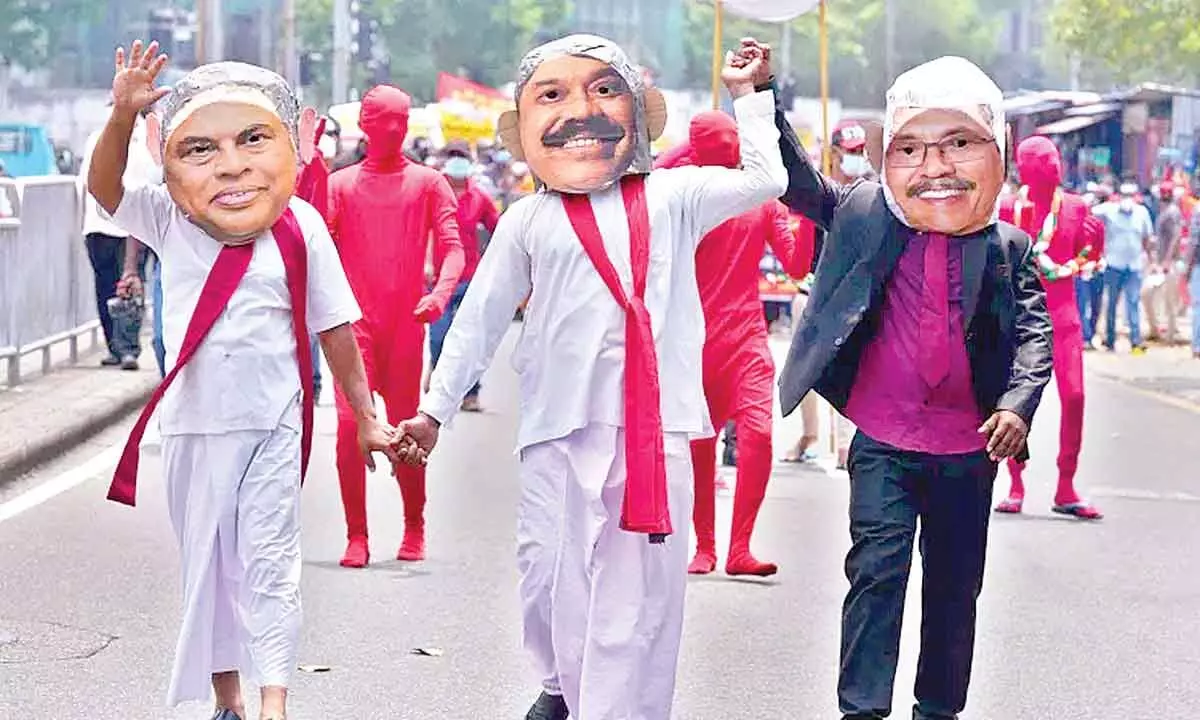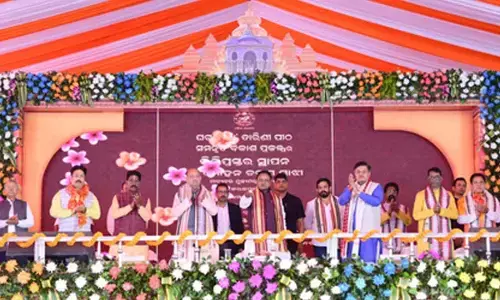A victim of fake democracy and crony nationalism

I have travelled to Sri Lanka many times a decade back to find inspiration to write my books.
I have travelled to Sri Lanka many times a decade back to find inspiration to write my books. I have written my first book 'Summit Your Everest' totally inspired by the breathtaking views of this beautiful island nation's forests and beaches.
I found Sri Lankans very warm, friendly, professional and rule-bound, which is quite unusual for a small South Asian country. Sri Lanka's centuries-old culture, dharma of Buddhism, education, and their simple life-style seemed as key reasons for harmony, calm and tranquillity.
I feel extremely painful to see Sri Lanka in such a disturbed state - economically, politically and socially. Sri Lankans don't deserve this situation. Unfortunately, I had analysed and foreseen the economic fall of Sri Lanka more than a year back.
The economic indicators were very apparent, and I could see an economic, political and social collapse. However, the national leadership of Sri Lanka has chosen to look the other way, instead of fixing visible symptoms of a full-blown economic cancer.
Are there lessons for other emerging economies from Sri Lanka's case? Of course, there are many. It is important for all emerging economies to learn from Sri Lanka's painful economic collapse. It is a textbook case of what not to do, with reference to macro and micro economic policies.
While there are many, I see three core reasons for the total collapse of Sri Lankan governance system, it can be a huge lesson for all emerging nations, especially democracies. Below are reasons for the economic downfall of Sri Lanka over a period of last 10 years.
Fake democracy
Sri Lanka, like many of its counterparts in South Asia, has made a mockery of democracy. A real democracy is not just about conducting periodic elections to elect leaders. The test for a real democracy is about how accountable, transparent, competent, and collective the elected government is functioning in the interest of its nation. Sri Lanka would have failed in the above 'real-democracy' test, even if applied ten years back.
Unilateralism, family dominance in governance, institutionalised corruption, dysfunctional council of ministers, enslaved institutions and compromised branches of state, are a perfect recipe for economic, political, and social disaster of any nation. Sri Lanka is no exception.
Rajapakse's hold on the national government and merry-go-around system of power transfer amongst one family has demolished the democratic credentials of this island nation. Consequences of this systemic manipulation is exhibitive to the entire world now. Faulty decisions, unilateralism, narrow vision, personal agenda and full-blown corruption for decades has brought down Sri Lanka. Discussion, debate, and deliberation in a democracy helps correct the course a national government takes. When this process is eliminated with a notion to make speedy decisions, even in the larger interest of the nation, it will only yield massive negative outcomes over years. Undermining the system and the process of democracy intentionally or unintentionally destroys the destiny of a democratic nation, sooner than later.
Fake and dysfunctional democracies rob the nationals of the security the system provides to course correct a national government's faulty decisions through well laid-out checks and balances. Overriding these essential democratic safeties through systemic manipulation, will over a period of time make a nation bereft of any credible institutional framework to review decision making process of all three branches of the state namely Legislature, Executive and Judiciary. A nation which destroys its own democratic systems, eventually gets destroyed. In the end, Sri Lankans' trust has been betrayed, their lives and livelihoods have been destroyed. They are deserted by the political leadership of the nation.
Crony nationalism & capitalism
A small island nation with about 20 million population doesn't need to be overtly capitalist and join the global economic rat race. Especially, when the nation's resources and its geographic location doesn't augur well with its overt ambitions. It is clear that Sri Lanka was drawn into the unwarranted battle of comparison with its larger South Asian neighbours by its national government. Sri Lanka's GDP growth rate spike of 2012 to a record high of 9.1 per cent and subsequent abysmal decline to 3.24 per cent the very next year highlights the massive government spend in the two years leading up to the record GDP growth rate. The nation has walked straight into a huge debt trap laid by China. The spend on unwarranted and disproportionate infrastructure investment into its ports and multi-lane highways have left a gaping hole in Sri Lanka's treasury and sunk the much needed liquidity and foreign exchange reserves.
For all the debt it has incurred and money it has invested, the mega infrastructure projects built by Chinese lie unutilised till today. The investment necessity, economic value addition and return on investment for the scale of infrastructure built, is clearly miscalculated, impractical and rushed.
This is not a post-mortem analysis. I am not writing this in retrospective after-thought. I have spoken and written about crony nationalism and crony capitalism multiple times in the last 5 years and highlighted how both these factors have the capacity to destroy not just small but even mid-size and large economies.
When nations rush into making decisions, either for crony capitalists or for the sake of competitive crony nationalism, they are bound to miss out on actual national purpose and factoring of real-time quantifiable economic returns. Multiple misplaced decisions like the above over a period, is enough to drive a nation towards serious economic mess.
Dual deficits
If a national economy is not planned and executed through budgetary fiscal discipline, it is bound to experience painful consequences. Adhocism and carelessness driven through incompetence, arrogance or ignorance in making macro-economic, fiscal or monetary decisions can wrong track even big economies. Sri Lanka is just a small economy and apparently couldn't absorb the size of economic shocks it has gotten itself into, in a decade of negligent and rushed macro policy decisions.
The pile up of fiscal deficit from one budget to another worked like a slow poison to numb the economic sensitivity for course correction in Sri Lanka. In fact, the government chose a quick-fix and printed currency to bridge the gap. Without many assets to monetise, this adhoc decision led to currency devaluation. In Sri Lanka the fiscal deficit is over 12.2 per cent of GDP and it was over 13.9 per cent last year. The danger line has been breached long before Covid-19, and the pandemic was metaphorically a nail in the economic coffin.
The double whammy which drove further pain is Sri Lanka's current account deficit. Sri Lanka recorded a current account deficit of 1.3 billion USD in March 2022 with a 1.1 billion USD deficit from the previous quarter For a nation which has such huge deficit in trade, where was the need to build multi billion-dollar shipping ports using Chinese debt?
The dual deficits lowered the economic credibility and credit rating, which isolated Sri Lanka from much needed global fund access, leading to defaulting on its payments. It's a vicious cycle that no nation should get entrapped into.
Lowered currency value, depleted foreign exchange reserves, import reliant domestic consumption, low exports have expanded the economic wound. Unfortunately, the national government was frozen with inaction and there was hardly anything they could do this late. The precious time for course-correction was very long back.
Conclusion
Self-reliance is critical for a nation to sail smooth in the tumultuous global economic scenario. Nations must realise that there are no permanent friends, especially when chips are down. There are certainly no free lunches.
Nations must be wary of why they are getting into debt and more importantly who is lending? Cheap debt can be a dangerous addiction and is potent enough to derail and destroy an economy. Globalisation needs to be rationalised by understanding one's own resources, opportunities and capabilities. If a nation bites more than it can chew, it will certainly arrive at an Intensive Care Unit (ICU). Over consumption, inflated prices, artificial growth, cheap debt, low savings, mis-defined development, bad investments, window dressed statistics together can destroy a nation and livelihoods of its citizens. A centuries-old, beautiful, and prosperous island nation like Sri Lanka has fallen into a deep economic abyss. Many symptoms which Sri Lanka has showcased for years before its fall are very much prevalent in many economies. I heartily wish they recover soon and regain their national pride. I also wish that other nations reflect and learn.
(The author is a Harvard Business School certified organisational strategist and a global expert in Emotional Intelligence)







